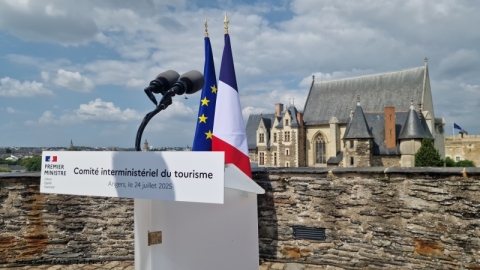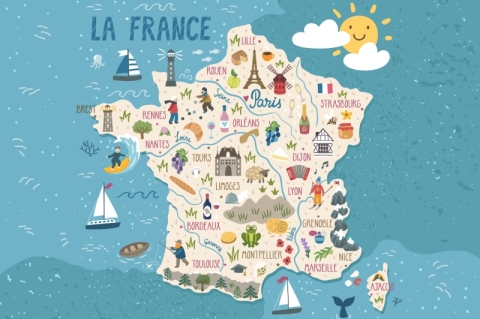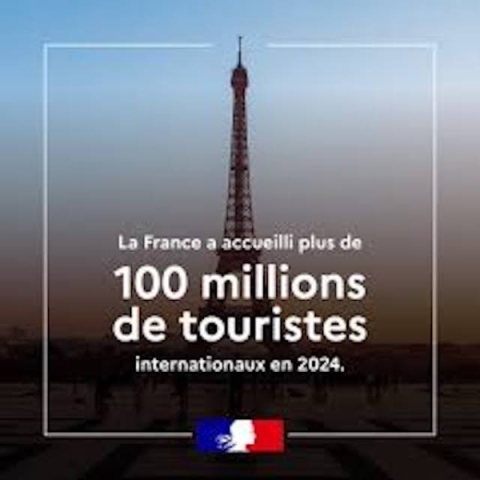Travel
VISIT OF PRIME MINISTER FRANCOIS BAYROU TO ANGERS, CITY OF HERITAGE& INNOVATION
TO BOOST TOURISM TARGET OF €100Bn REVENU

French PM Bayrou Intermin- Committee Angers (Source: Rahma Sophia Rachdi, Jedi Foster)
USPA NEWS -
On July 26, 2025, French Prime Minister François Bayrou traveled from Paris to Angers via (Speed Train) TGV for a strategic ministerial visit focused on boosting business tourism and promoting inclusive access to heritage sites. Upon arrival at Angers Saint-Laud train station, the Prime Minister received a Republican welcome, greeted by the Prefect of Maine-et-Loire and Angers’ Mayor Christophe Bechu.
Around 2:00 PM, the Prime Minister, accompanied by seven government ministers, began a walking tour near Place Kennedy, just steps away from the station, before entering the iconic Château d’Angers a magnificent medieval fortress overlooking the River Maine. Today, as the country welcomes over 100 million tourists and celebrates €71 billion in tourism revenue, it must also confront a difficult truth: 40% of disabled people in France never go on vacation because destinations remain inaccessible. This, too, is part of the unveiling. This, too, demands Revelation. From the towers of Angers, France is reminded that resilience is a legacy, and inclusion is not charity, it’s dignity. Our correspondent travelled with the Prime Minister and his seven member of government for this coverage.
Around 2:00 PM, the Prime Minister, accompanied by seven government ministers, began a walking tour near Place Kennedy, just steps away from the station, before entering the iconic Château d’Angers a magnificent medieval fortress overlooking the River Maine. Today, as the country welcomes over 100 million tourists and celebrates €71 billion in tourism revenue, it must also confront a difficult truth: 40% of disabled people in France never go on vacation because destinations remain inaccessible. This, too, is part of the unveiling. This, too, demands Revelation. From the towers of Angers, France is reminded that resilience is a legacy, and inclusion is not charity, it’s dignity. Our correspondent travelled with the Prime Minister and his seven member of government for this coverage.
VISIT OF PRIME MINISTER FRANCOIS BAYROU TO ANGERS, CITY OF HERITAGE & INNOVATION
TO BOOST TOURISM TARGET OF €100Bn REVENUE
On July 26, 2025, French Prime Minister François Bayrou traveled from Paris to Angers via (Speed Train) TGV for a strategic ministerial visit focused on boosting business tourism and promoting inclusive access to heritage sites. Upon arrival at Angers Saint-Laud train station, the Prime Minister received a Republican welcome, greeted by the Prefect of Maine-et-Loire and Angers’ Mayor Christophe Bechu.
Around 2:00 PM, the Prime Minister, accompanied by seven government ministers, began a walking tour near Place Kennedy, just steps away from the station, before entering the iconic Château d’Angers a magnificent medieval fortress overlooking the River Maine.
TO BOOST TOURISM TARGET OF €100Bn REVENUE
On July 26, 2025, French Prime Minister François Bayrou traveled from Paris to Angers via (Speed Train) TGV for a strategic ministerial visit focused on boosting business tourism and promoting inclusive access to heritage sites. Upon arrival at Angers Saint-Laud train station, the Prime Minister received a Republican welcome, greeted by the Prefect of Maine-et-Loire and Angers’ Mayor Christophe Bechu.
Around 2:00 PM, the Prime Minister, accompanied by seven government ministers, began a walking tour near Place Kennedy, just steps away from the station, before entering the iconic Château d’Angers a magnificent medieval fortress overlooking the River Maine.
Inside this 13th-century castle, commissioned by Louis IX (Saint Louis) in the early 1200s, lies one of the greatest treasures of medieval art: the Tapestry of the Apocalypse, a monumental masterpiece measuring over 100 meters long and 4.5 meters high. Commissioned between 1377 and 1382 by Louis I, Duke of Anjou, the tapestry illustrates the Book of Revelation not as a tale of destruction, but as a message of hope and transcendence, depicting the path to paradise. This UNESCO-listed work is the oldest and largest surviving medieval tapestry cycle in the world, symbolizing both spiritual resilience and artistic excellence in the late Middle Ages. (Source: Château d’Angers / Centre des Monuments Nationaux).
The visit continued in the castle’s majestic Gothic chapel, where the Prime Minister chaired a two-hour closed-door working session. This culminated in the signing of a major industry contract on business tourism and events with UNIMEV (Union Française des Métiers de l’Evenementiel), France Congres et Evenements, Régions de France, and France Urbaine. Renowned Michelin-starred chef Thierry Marx was also in attendance, supporting the culinary dimension of event tourism.
The visit continued in the castle’s majestic Gothic chapel, where the Prime Minister chaired a two-hour closed-door working session. This culminated in the signing of a major industry contract on business tourism and events with UNIMEV (Union Française des Métiers de l’Evenementiel), France Congres et Evenements, Régions de France, and France Urbaine. Renowned Michelin-starred chef Thierry Marx was also in attendance, supporting the culinary dimension of event tourism.
Later, on the panoramic terrace of the château overlooking the city bathed in radiant sunshine, a press conference was held at 5:45 PM with around twenty journalists from the national and regional media.
Angers was not chosen by chance. Crowned “France’s most pleasant city to live in” in 2024, Angers boasts an exceptional mix of green urbanism, soft mobility, and technological innovation. As a leading technopole and sustainability hub in western France, the city aligns perfectly with the government’s new roadmap on green and inclusive tourism.
Yet, not all voices found room to be heard. When a question was raised about inclusive tourism and disability access, several accredited journalists from mainstream outlets declined to report on the matter.
Angers was not chosen by chance. Crowned “France’s most pleasant city to live in” in 2024, Angers boasts an exceptional mix of green urbanism, soft mobility, and technological innovation. As a leading technopole and sustainability hub in western France, the city aligns perfectly with the government’s new roadmap on green and inclusive tourism.
Yet, not all voices found room to be heard. When a question was raised about inclusive tourism and disability access, several accredited journalists from mainstream outlets declined to report on the matter.
This, despite the fact that Axis 4 of the newly signed roadmap specifically addresses the urgent need to enable the 40% of people with disabilities in France who never travel due to inaccessible transport and accommodations to finally take vacations like everyone else. In response to this omission, the Prime Minister’s office offered a follow-up interview with the Minister of Tourism in the coming days to discuss in greater detail the accessibility measures envisioned a topic still too often ignored by parts of the media, despite affecting 15% of the French population.
HOPE IS NOT A PERFORMANCE, IT’S RESISTANCE. FROM ANGERS, A REVELATION
On July 27th, 2025, France’s Prime Minister chose the historic Château d’Angers a fortress built between 1230 and 1240 during the reign of Blanche of Castile, mother of Saint Louis (King Louis IX) to deliver a powerful national address. This was no ordinary stage. Angers is home to the world’s largest medieval tapestry, and one of France’s greatest cultural treasures: The Apocalypse Tapestry. But let’s get one thing straight:
Apocalypse does not mean "the end of the world." Its original Greek meaning “apokálypsis”is “revelation,” “unveiling,” a moment of truth.
It is not about destruction, but about clarity. About seeing what has been hidden, and finding the courage to act.
Commissioned in 1375 by Louis I, Duke of Anjou, brother to King Charles V, and woven between 1377 and 1382, the tapestry tells the story of Saint John’s Book of Revelation not as a tale of chaos, but as a bold, symbolic vision of justice, resistance, and hope.
On July 27th, 2025, France’s Prime Minister chose the historic Château d’Angers a fortress built between 1230 and 1240 during the reign of Blanche of Castile, mother of Saint Louis (King Louis IX) to deliver a powerful national address. This was no ordinary stage. Angers is home to the world’s largest medieval tapestry, and one of France’s greatest cultural treasures: The Apocalypse Tapestry. But let’s get one thing straight:
Apocalypse does not mean "the end of the world." Its original Greek meaning “apokálypsis”is “revelation,” “unveiling,” a moment of truth.
It is not about destruction, but about clarity. About seeing what has been hidden, and finding the courage to act.
Commissioned in 1375 by Louis I, Duke of Anjou, brother to King Charles V, and woven between 1377 and 1382, the tapestry tells the story of Saint John’s Book of Revelation not as a tale of chaos, but as a bold, symbolic vision of justice, resistance, and hope.
By standing before this monumental artwork, now recognized by UNESCO as a “Memory of the World”, the Prime Minister sent a message far beyond politics. It was a statement about who we are and who we want to become.
The choice of Angers was no coincidence. In 2024, it was ranked “France’s most liveable city” (source: JDD, “Villes et villages où il fait bon vivre”), and it embodies a forward-thinking model: green mobility, sustainable urban planning, and inclusive innovation. A city that blends historical memory with a vision for the future.
The choice of Angers was no coincidence. In 2024, it was ranked “France’s most liveable city” (source: JDD, “Villes et villages où il fait bon vivre”), and it embodies a forward-thinking model: green mobility, sustainable urban planning, and inclusive innovation. A city that blends historical memory with a vision for the future.
IT IS NOW THAN EVER TO BOOST TOURISM TARGET FROM €71 TO €100Bn REVENUE BY INNOVATING AND SHAPING UP THE FRENCH MINDSET
Today, as the country welcomes over 100 million tourists and celebrates €71 billion in tourism revenue, it must also confront a difficult truth: 40% of disabled people in France never go on vacation because destinations remain inaccessible. This, too, is part of the unveiling. This, too, demands Revelation. From the towers of Angers, France is reminded that resilience is a legacy, and inclusion is not charity, it’s dignity. The timing of this Interministerial Tourism Committee, held on Thursday, July 24th in Angers, was no coincidence. It closely followed the anniversary of the opening of the Paris 2024 Olympic and Paralympic Games, providing the perfect moment to highlight the exceptionally positive and globally recognized tourism outcomes of 2024. It also served as an opportunity to present the government's strategic priorities for the years ahead, as outlined by Nathalie Delattre, Minister Delegate in charge of Tourism, with the goal of sustaining this momentum in the long term. (Source: Prime Minister’s Office, Matignon).
Today, as the country welcomes over 100 million tourists and celebrates €71 billion in tourism revenue, it must also confront a difficult truth: 40% of disabled people in France never go on vacation because destinations remain inaccessible. This, too, is part of the unveiling. This, too, demands Revelation. From the towers of Angers, France is reminded that resilience is a legacy, and inclusion is not charity, it’s dignity. The timing of this Interministerial Tourism Committee, held on Thursday, July 24th in Angers, was no coincidence. It closely followed the anniversary of the opening of the Paris 2024 Olympic and Paralympic Games, providing the perfect moment to highlight the exceptionally positive and globally recognized tourism outcomes of 2024. It also served as an opportunity to present the government's strategic priorities for the years ahead, as outlined by Nathalie Delattre, Minister Delegate in charge of Tourism, with the goal of sustaining this momentum in the long term. (Source: Prime Minister’s Office, Matignon).
Because as one activist once said, “Hope is not about performance. It is resistance.” And this summer, hope spoke from stone walls, woven silk, and a timeless truth.
BOOSTING FRANCE’S TOURISM ECONOMY: FROM 71 TO 100 BILLION EUROS BY 2030 IE REACHEABLE IF THE EFFORT IS NATIONAL AND COLLECTIVE
In 2024, France welcomed 100 million international visitors, reaffirming its status as the world’s leading tourist destination. But sheer visitor numbers are no longer enough. To ensure that tourism remains a driving force of the national economy, the focus now lies on the revenue it generates. With €71 billion in international tourism receipts in 2024, a rise of 8% compared to 2023, France ranks fourth globally, behind the United States, Spain, and the United Kingdom. The tourism sector now accounts for 8% of the country’s GDP and provides 2 million direct and indirect jobs. “I’ve set a clear goal for French tourism: by 2030, we must grow from €71 to €100 billion in international tourism receipts,” the Prime Minister stated.
In 2024, France welcomed 100 million international visitors, reaffirming its status as the world’s leading tourist destination. But sheer visitor numbers are no longer enough. To ensure that tourism remains a driving force of the national economy, the focus now lies on the revenue it generates. With €71 billion in international tourism receipts in 2024, a rise of 8% compared to 2023, France ranks fourth globally, behind the United States, Spain, and the United Kingdom. The tourism sector now accounts for 8% of the country’s GDP and provides 2 million direct and indirect jobs. “I’ve set a clear goal for French tourism: by 2030, we must grow from €71 to €100 billion in international tourism receipts,” the Prime Minister stated.
The Prime Minister had, in fact, announced on July 15th a series of drastic measures aimed at reducing the public deficit by €43.8 billion by 2026. He clearly warned that “everyone” would “have to take part in the effort” to restore public finances.
According to the Prime Minister, in a context of intense international competition, the goal is to simplify and modernize tourism regulations while creating a framework that allows the sector to reach its full potential. This includes strengthening financing options and enhancing the appeal of tourism-related careers. The industry must also capitalize on France’s many assets by developing new tourism offerings rooted in regional diversity, heritage, craftsmanship, and culture….
FRANCE SHOULD IMPROVE OPENESS, INCLSUIVITY AND LOWER LANGUAGE BARRIERS , TO BTETER THE TOURISTIC OFFER
The Prime Minister is undoubtedly right to capitalize on the immense potential of tourism, which currently generates between €71 billion and €100 billion annually, reinforcing France’s position as the world’s leading tourist destination. However, to maintain and grow this vital economic pillar, it is crucial to listen closely to the evolving needs, desires, and expectations of the 100 million visitors who come to France each year. These tourists are increasingly demanding authentic, sustainable, and inclusive experiences that respect the environment and celebrate the country’s rich diversity.
France, a vast land of cultural and territorial variety, offers endless opportunities for unique travel experiences. This economic boon is essential, especially at a time when the country faces significant public debt nearing €3 trillion. The Prime Minister had, in fact, announced on July 15th a series of drastic measures aimed at reducing the public deficit by €43.8 billion by 2026. His recent announcements on budgetary constraints and reforms, including the reduction of public holidays, underscore the urgency of boosting revenue through innovation and excellence in tourism.
While France enjoys a strong international appeal and goodwill, it cannot afford to rest on its laurels. It must continuously innovate and improve its tourism offerings, embracing greater openness to the world, promoting multilingualism, and, above all, fostering a more inclusive mindset, for real, not just on the papers. Addressing barriers such as language and accessibility particularly for people with disabilities is key to transforming France into a truly welcoming and attractive destination.
Changing the way difference is perceived is essential to sustain France’s magnetism and remain at the top of global tourist destinations. Only by embracing these values can France continue to thrive economically while respecting social and environmental responsibilities.
Liability for this article lies with the author, who also holds the copyright. Editorial content from USPA may be quoted on other websites as long as the quote comprises no more than 5% of the entire text, is marked as such and the source is named (via hyperlink).









